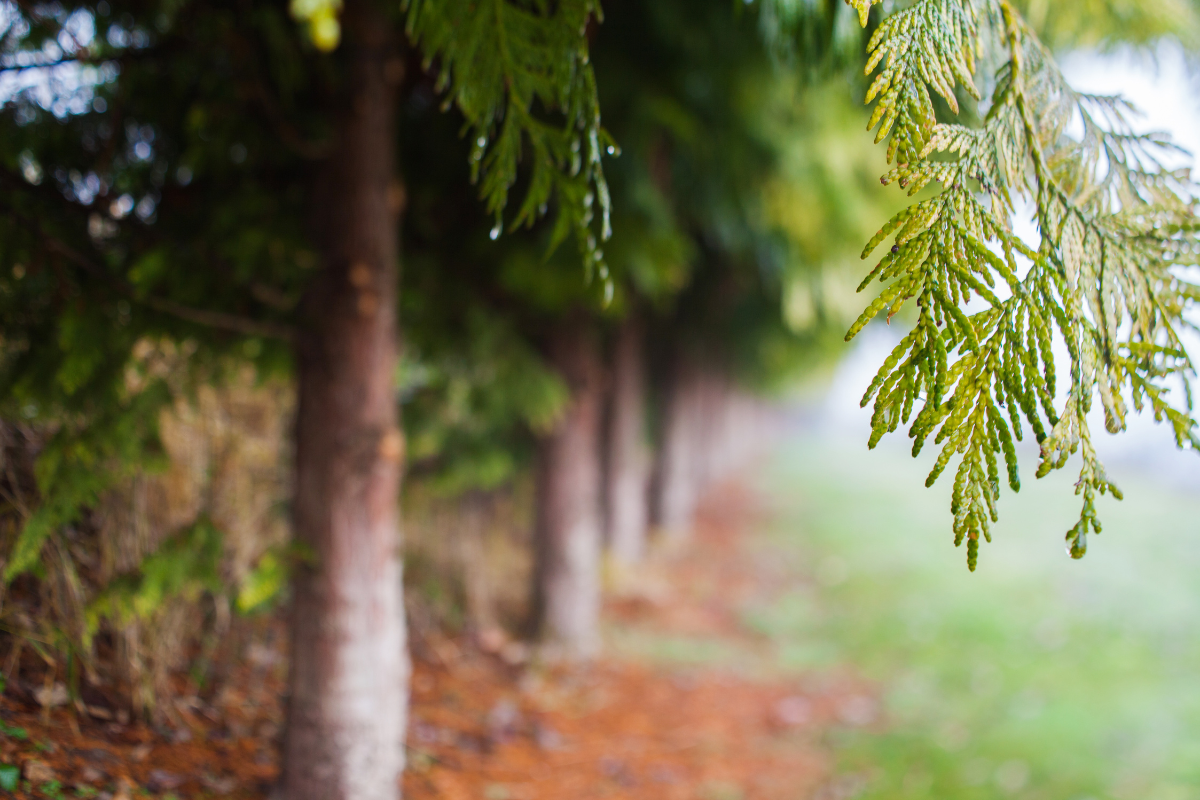As the crisp November air settles in San Antonio, Texas, a familiar chill marks the beginning of the holiday season. However, for many locals, this time of year also signals the arrival of a familiar guest – mountain cedar pollen.
If you're experiencing itchy eyes, sneezing fits, and the overall discomfort that comes with this seasonal allergy, read on! We'll guide you through the upcoming cedar allergy season, ensuring you enjoy the festivities without the hassle of allergy symptoms.
Preparation for Texas Mountain Cedar Season
For those unfamiliar with the term, mountain cedar (Juniperus ashei) is a juniper tree native to central Texas. While its silvery-green appearance adds a touch of natural beauty to the landscape, it releases copious amounts of
pollen during its mating season, which typically peaks in December and January. Unfortunately, this also means heightened symptoms for those affected, necessitating the need for proactive allergy management.
What Is An Allergy?
Before we take a deep dive into allergy management, let's walk through the basics of the condition. An allergy is an adverse immune reaction to substances known as
allergens. These substances are generally harmless, but they can trigger an immune system response in some people.
Common allergens:
When someone with allergy sensitivity comes into contact with an allergen, their natural defenses typically produce antibodies called
immunoglobulin E (IgE). These antibodies cause the release of chemicals like
histamine, which leads to allergy symptoms.
These symptoms vary, but those caused by pollen usually include itching, runny nose, sneezing,
hives, swelling, and sometimes wheezing and difficulty breathing for patients with allergic asthma.
There are several ways to effectively manage allergies, including allergen avoidance, medications, and, in some cases, undergoing immunotherapy.
Common Cedar Tree Allergy Symptoms
Cedar allergy symptoms can present in diverse ways, and the manifestation of symptoms may differ from person to person. Therefore, it is crucial to seek guidance from your
allergist for thorough allergy testing and confirmation. Consulting with a specialist will help accurately identify the specific triggers and tailor an effective treatment plan to alleviate your symptoms.
Common mountain cedar allergy symptoms include:
- Sneezing: Allergic reactions often trigger the release of histamine. It leads to irritation in the nasal passages and sneezing.
- Runny or Stuffy Nose: Inflammation in the nasal passages may cause a runny or congested nose, making breathing difficult.
- Itchy or Watery Eyes: Irritation of the eyes is a common mountain cedar allergy symptom, causing itching, redness, and excessive production of tears.
- Sore Throat: Postnasal drip from mountain cedar allergies causes a scratchy or sore throat.
- Coughing: Exposure to cedar allergens may lead to irritation in the respiratory tract, prompting coughs as the body attempts to clear the airways.
- Shortness of Breath: In more severe cases, exposure to cedar allergens leads to difficulty breathing, especially in individuals with conditions like
asthma.
- Wheezing: Constriction of the airways leads to wheezing, a high-pitched sound that occurs during breathing.
- Fatigue: Allergic reactions may exhaust the body, leading to fatigue and general tiredness.
- Skin Reactions: Some people may experience skin-related symptoms, such as hives (raised, red welts on the skin) or
eczema (itchy, inflamed skin).
- Headache: Allergies contribute to headaches, particularly sinus headaches, due to congestion and pressure in the sinus cavities.
If you suspect you have allergies, it is best to talk with an allergy expert for proper diagnosis and management.
Tips for Preparing and Managing Cedar Allergies
- Schedule a Consultation: Consult with
allergy experts if you have or suspect you have cedar allergies. They will help you understand your specific triggers, create a personalized treatment plan, and equip you with the knowledge to navigate this mountain cedar allergy season successfully.
- Stay Informed: Learn everything you can about
pollen levels in the area to prepare for high cedar pollen days. This information allows you to plan outdoor activities on days when the cedar tree pollen count is lower, minimizing your exposure to cedar allergens.
- Follow Medication Plans: Whether it's
antihistamines,
nasal corticosteroid sprays, or other prescription medications, allergy specialists help develop a medication plan tailored to your needs. Consistent allergy treatment using anti-allergy drugs significantly alleviates symptoms and improves overall quality of life.
- Allergy-Proof Your Home: Simple measures like
high-efficiency particulate air (HEPA) filters, keeping windows closed, and regularly cleaning surfaces make a substantial difference in keeping allergens at bay.
Breathe Easy During Texas Mountain Cedar Season
As the Mountain Cedar pollen descends upon San Antonio, Texas, there's no need to let cedar allergies dampen your holiday spirit. With ample prep time, you'll efficiently manage mountain cedar allergies and enjoy The Alamo City fully. Take the first step towards a sneeze-free holiday by contacting the experts at Apex – because breathing easy should be a year-round affair.
FAQs
Q: When is San Antonio mountain cedar allergy season?
A: The mountain cedar allergy season typically occurs from mid December to early March. The peak of pollen release is often in January, and people allergic to cedar pollen may experience heightened symptoms during this period.
Q: What are the common symptoms of mountain cedar allergy?
A: Common symptoms include sneezing, nasal congestion, itchy or watery eyes, and throat irritation. In some cases, people may also experience fatigue and general malaise.
Q: How can I manage mountain cedar allergy symptoms?
A: To manage symptoms, consider the following:
- Use over-the-counter antihistamines.
- Nasal corticosteroid sprays may reduce inflammation.
- Keep windows closed during peak pollen times.
- Use air purifiers indoors.
- Shower and change clothing after spending time outdoors.
Q: Can mountain cedar allergies be prevented?
A: While complete prevention may be challenging, you may take steps to minimize exposure:
- Medication: Consult your allergist for appropriate medications, such as antihistamines or nasal corticosteroids, to help manage symptoms.
- Allergy Shots: In some cases, allergen immunotherapy (allergy shots) may be recommended by your allergist to desensitize your immune system to cedar pollen over time.
- Consult an Allergist: Consult with your allergist for personalized advice based on your specific allergy profile.
- Tips and Tricks: Stay indoors during peak pollen times, use sunglasses to protect your eyes from pollen, and keep windows closed.
Q: How is mountain cedar allergy diagnosed?
A:
Allergy testing, such as skin prick or blood tests, helps diagnose mountain cedar allergy. Consult with an allergist for proper evaluation and diagnosis.
Q: Are there any long-term solutions for mountain cedar allergies?
A: Immunotherapy (allergy shots) is a long-term solution that helps desensitize the immune system to allergens. It helps reduce the severity of allergies in the long run.
Q: Can children develop mountain cedar allergies?
A: Yes, children may develop allergies to mountain cedar pollen. If you suspect allergies in your child, consult a pediatrician or allergist for proper evaluation and management.
Q: When should I seek medical attention for mountain cedar allergy symptoms?
A: If severe and persistent symptoms or over-the-counter medications do not relieve your symptoms, seek medical attention. An allergist offers a comprehensive evaluation and recommends appropriate treatments.
Survive Mountain Cedar Allergy Season Like a Pro!
You have completed your crash course in preparing for cedar season in San Antonio.
Now that you've gathered insights into navigating the mountain cedar season in San Antonio, Texas, and the various strategies to manage cedar allergy symptoms, it's time to craft your individualized allergy treatment plan.
Our board-certified
Apex Allergy and Asthma allergist is happy to provide maximum protection against allergies, asthma, and similar conditions. Mark Stahl, DO, and his team uses evidence-based treatment plans for your needs.
Call us at (210) 490-2051 or
book an appointment that suits your schedule.






